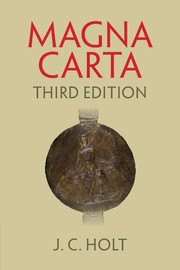Book contents
- Frontmatter
- Dedication
- Contents
- List of plates
- Preface to third edition
- Preface to second edition
- Preface to first edition
- Acknowledgements
- Abbreviations
- Introduction
- 1 The Charter and its history
- 2 Government and society in the twelfth century
- 3 Privilege and liberties
- 4 Custom and law
- 5 Justice and jurisdiction
- 6 Crisis and civil war
- 7 Quasi Pax
- 8 The quality of the Great Charter
- 9 The achievement of 1215
- 10 From distraint to war
- 11 The re-issues and the beginning of the myth
- Appendices
- References
- Index
- Plate section
Preface to third edition
Published online by Cambridge University Press: 05 July 2015
- Frontmatter
- Dedication
- Contents
- List of plates
- Preface to third edition
- Preface to second edition
- Preface to first edition
- Acknowledgements
- Abbreviations
- Introduction
- 1 The Charter and its history
- 2 Government and society in the twelfth century
- 3 Privilege and liberties
- 4 Custom and law
- 5 Justice and jurisdiction
- 6 Crisis and civil war
- 7 Quasi Pax
- 8 The quality of the Great Charter
- 9 The achievement of 1215
- 10 From distraint to war
- 11 The re-issues and the beginning of the myth
- Appendices
- References
- Index
- Plate section
Summary
Dear Jim,
There used to be a myth current here that Goronwy Edwards was the bastard son of Stubbs –because he knew so well Stubbs' Charters. Having read your book I am inclined to think posterity may see in you Stubbs' grandson – for both of you hail from Yorkshire, and your book reminds me, in its massive detail and its judicious comment, more of the Constitutional History than any single book written since.
In February 2014 we were approached and asked if we would prepare this now classic work, first published to accompany the seven hundred and fiftieth anniversary of Magna Carta, for republication at the beginning of the eight hundredth anniversary. Since 2011 Jim Holt had been so physically infirm that he was no longer capable of revising his book himself. We had both visited him frequently during the period of his infirmity, and knew well that he continued to reflect on these matters and still relished discussing them. ‘Bloody rubbish!’, he exploded when one of us had the temerity to suggest that the true identity of ‘Glanvill’ might just conceivably be Samson, abbot of Bury St Edmunds. If anything, medieval history grew in intensity and immediacy because his circumscribed, house-bound existence provided little alternative stimulation.
Neither of us hesitated for a moment about accepting the invitation, both out of filial piety and because we were confident that the book which Jim had greatly expanded for the Second Edition in 1992 was not going to be surpassed in the deluge of publications which would inevitably swamp 2015. It deserved to be brought up to date, to take account of what had been published since 1992, and also to explain how and why Jim had rethought so much for the Second Edition – the magnitude of the rethink is evidenced by the fact that the Second Edition is 175 pages longer than the First. But we did so with a scintilla of trepidation, because we were all too aware that he knew we were at work.
- Type
- Chapter
- Information
- Magna Carta , pp. xi - xiiiPublisher: Cambridge University PressPrint publication year: 2015



